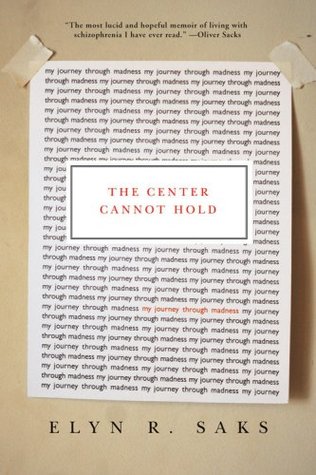More on this book
Community
Kindle Notes & Highlights
When you’re really crazy, respect is like a lifeline someone’s throwing you. Catch this and maybe you won’t drown.
Once, there’d been a time in my life when thoughts were something to be welcomed, and pored over, like pages in a favorite book. Just to idly think about things—the weather, the future, the subject of a paper I needed to write for a class, the friend I was going to meet for a cup of coffee—these things felt so simple, so taken-for-granted. But now thoughts crashed into my mind like a fusillade of rocks someone (or something) was hurtling at me—fierce, angry, jagged around the edges, and uncontrollable. I could not bear them, I did not know how to defend myself against them, and I could not
...more
She was so formal in her personal manner, somewhat distant, even unsympathetic, and apparently I made her anxious as well—she was obviously uncomfortable when we were the only two in a room together. I didn’t trust her, and I certainly didn’t believe she had any idea of what to do with me.
Psychotic people who are paranoid do scary things because they are scared.
One afternoon on the unit, one of the patients, Henry—suddenly and without apparent provocation—jumped full-body on another patient, screaming wildly as he did so. Staff and some other patients pulled him off and away, taking him to a different part of the unit, where he sat and calmed himself. An hour or so later, a doctor came in and sat with Henry, quietly telling him that what he’d done wasn’t appropriate and couldn’t happen again. There was no punishment for Henry’s infraction, no beefy orderlies standing ready to mete out some kind of response, and no physical restraints. No
...more
Were they wanting to help me get better, or did they just want me to be socially appropriate?
This is a classic bind for psychiatric patients. They’re struggling with thoughts of wanting to hurt themselves or others, and at the same time, they desperately need the help of those they’re threatening to harm. The conundrum: Say what’s on your mind and there’ll be consequences; struggle to keep the delusions to yourself, and it’s likely you won’t get the help you need.
“You know, it’s my opinion that ‘just don’t do it’ is usually said by somebody who just doesn’t get it.”
Immediately, every sight, every sound, every smell coming at you carries equal weight; every thought, feeling, memory, and idea presents itself to you with an equally strong and demanding intensity. You’re receiving a dozen different messages in a dozen different media—phone, e-mail, TV, CD player, friend knocking at the door, ideas inside your head—and you’re unable to choose which ones come to the front and which are relegated to “later.” It’s the crowd at the Super Bowl, and they’re all yelling directly at you.
Where a completely predictable disaster happened: The ER discovered that I had a psychiatric history. And that was the end of any further diagnostic work. Stigma against mental illness is a scourge with many faces, and the medical community wears a number of those faces. A psychiatric patient at a program where Steve once worked went for weeks with a broken back; none of the medical people the patient saw took the man’s pain seriously—he was a mental patient. So once the ER learned I had a mental illness and was on antipsychotic medication, the diagnosis was written in stone: I was “just”
...more
As someone who benefits from medication, I know that the question of when one should be allowed to refuse is a complicated one. But I also believe that individual autonomy is vitally important, even precious—after all, it’s central to who we are as humans on the planet, with free will and self-ownership.


